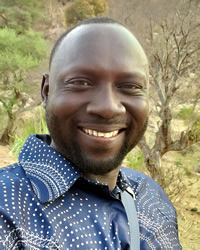Shwai in Sudan

Photo Source:
Anonymous
|
Send Joshua Project a map of this people group.
|
| People Name: | Shwai |
| Country: | Sudan |
| 10/40 Window: | Yes |
| Population: | 8,800 |
| World Population: | 8,800 |
| Primary Language: | Shwai |
| Primary Religion: | Islam |
| Christian Adherents: | 0.20 % |
| Evangelicals: | 0.05 % |
| Scripture: | Translation Started |
| Ministry Resources: | No |
| Jesus Film: | No |
| Audio Recordings: | Yes |
| People Cluster: | Nuba Mountains |
| Affinity Bloc: | Sub-Saharan Peoples |
| Progress Level: |
|
Introduction / History
The Shwai people live in the central regions of Chad, particularly around the Guéra Mountains. They have a long history in this area, with deep roots in both agriculture and pastoralism. The Shwai have maintained their identity through various challenges, including environmental pressures and historical conflicts with neighboring groups. Over the centuries, they have developed a strong sense of community and resilience, adapting their way of life to the demands of their environment.
What Are Their Lives Like?
The Shwai people sustain themselves primarily through farming and animal husbandry. They grow millet, sorghum and maize which form the basis of their diet and economy. Livestock, including cattle, goats and sheep are highly valued both as a source of income and as a measure of social status.
Shwai villages are often small and scattered, with families living in close proximity to their farmlands. Life revolves around seasonal cycles, with communal activities centered on planting, harvesting and tending to livestock.
What Are Their Beliefs?
The Shwai people practice a combination of traditional African religions and Islam. Islamic practices have been integrated into their daily lives, but many Shwai continue to observe traditional rituals and ceremonies. These practices are often tied to the land and nature, reflecting their deep connection to the environment. Ancestor worship and the veneration of spirits play a significant role in their spiritual life, influencing how they approach everything from agriculture to social relations.
What Are Their Needs?
The Shwai community faces several critical needs. Access to education is limited, with many children unable to attend school regularly due to distance and lack of resources. Healthcare services are scarce, and many Shwai rely on traditional medicine or must travel far to receive basic medical care. Water scarcity, particularly during the dry season, is another major challenge, affecting both their agriculture and daily living conditions. Economic opportunities are minimal, leading to widespread poverty and limited prospects for improving their quality of life.
Prayer Points
Pray the hearts of the Shwai people would be stirred to hunger after God, to drink of living water.
Pray for family-based Disciple Making Movements to soon transform Shwai society, blessing them spiritually and economically.
Pray for the Lord to move in the hearts of believers to give up their own rights and sacrifice their lives to see the Shwai people blessed by the work of Jesus Christ, the only savior.